
Reflections from a Global Videoconference on Climate Change and Oil Dependence at the World Bank
In this office we get into some heated debates. Sometimes they center on our ideals for the justices of tipping our waiters, but oftentimes they extend well beyond our daily lives to the bigger questions in life—how do we solve any of these global problems?
We are always educating and informing one another about our various backgrounds and expertise, enlightening again and again from the various facets of our knowledge. I, personally, am always talking about trees. Andy, Jeremy, and Josh tend to focus on nuclear war. Kathleen is in the Middle East, whereas Gabe and Fred are posing China and Asia’s viewpoint to our questions. We seem separated by our disciplines, but from attending a World Bank Conference today, I am reminded that our focuses are much more intertwined than at first glance and maybe…we are all tree-huggers after all.
I had the privilege, an invitation often offered to AU students, to attend a World Bank global videoconference related to climate change and oil dependence. The conference was sponsored by Americans for an Informed Democracy and highlighted Ian Noble from the World Bank, U.S. Representative Edward J. Markey of Massachusetts, 2020 Vision Executive Director Tom Z. Collina, the Dean of Environmental Engineering and Geology via satellite from Ecuador and numerous university campuses around the U.S. The purpose of the videoconference was to engage Americans in global conversation about policy and more specifically, about climate change. We’ve been labeled the ‘green generation’ and with that labeling, given a formidable task to right quite a few of the wrongs from past generations. And these wrongs do not limit themselves to the environmental realm. One thing I have become blatantly aware of through numerous discussions in grad school is that everything is so much more connected than I ever imagined. Which is why we are all tree-huggers after all. And why I should be just as concerned about nuclear warheads and political stability as my colleagues should be about those trees.
The debate that unfolded throughout this conference touched on everything each of us in this office has studied, analyzed and is struggling to understand and find answers for. Discussions ranged from mitigation and adaptability strategies in developed and developing countries; comfort level and sacrifice; oil dependency and ultimate security in a nation; democracy; food supplies; policies both local and global; poverty reduction and technology, just to name a few. Foreign relations are deeply tied to any mitigation and adaptability scheme as well as when and how we push for different technologies. Any type of policy for the future should contain a way to incorporate the risks of climate change, because they affect development, security, international relations, power and economics. I need to care about the security of a nation, because no development occurs in a battlefield. And that could highly depend on oil dependence and foreign relations. And my counterparts need to care about the resources of a country in order to understand their real position related to development and security. We are much more linked than I could have ever imagined and it took climate change for me to see it.
Which makes me a little more optimistic about our discussions. We’re becoming experts in our respective fields, but we are also learning how to teach each other. This is important, because our work for the future requires us to understand all of these complexities. It is absolutely unavoidable. And I couldn’t think of a better team to face those challenges with, although begrudgingly they might not admit to their inner ‘tree-hugger’… but we’ll get there. And I’ll cross over too, since we’re in this together.
In this office we get into some heated debates. Sometimes they center on our ideals for the justices of tipping our waiters, but oftentimes they extend well beyond our daily lives to the bigger questions in life—how do we solve any of these global problems?
We are always educating and informing one another about our various backgrounds and expertise, enlightening again and again from the various facets of our knowledge. I, personally, am always talking about trees. Andy, Jeremy, and Josh tend to focus on nuclear war. Kathleen is in the Middle East, whereas Gabe and Fred are posing China and Asia’s viewpoint to our questions. We seem separated by our disciplines, but from attending a World Bank Conference today, I am reminded that our focuses are much more intertwined than at first glance and maybe…we are all tree-huggers after all.
I had the privilege, an invitation often offered to AU students, to attend a World Bank global videoconference related to climate change and oil dependence. The conference was sponsored by Americans for an Informed Democracy and highlighted Ian Noble from the World Bank, U.S. Representative Edward J. Markey of Massachusetts, 2020 Vision Executive Director Tom Z. Collina, the Dean of Environmental Engineering and Geology via satellite from Ecuador and numerous university campuses around the U.S. The purpose of the videoconference was to engage Americans in global conversation about policy and more specifically, about climate change. We’ve been labeled the ‘green generation’ and with that labeling, given a formidable task to right quite a few of the wrongs from past generations. And these wrongs do not limit themselves to the environmental realm. One thing I have become blatantly aware of through numerous discussions in grad school is that everything is so much more connected than I ever imagined. Which is why we are all tree-huggers after all. And why I should be just as concerned about nuclear warheads and political stability as my colleagues should be about those trees.
The debate that unfolded throughout this conference touched on everything each of us in this office has studied, analyzed and is struggling to understand and find answers for. Discussions ranged from mitigation and adaptability strategies in developed and developing countries; comfort level and sacrifice; oil dependency and ultimate security in a nation; democracy; food supplies; policies both local and global; poverty reduction and technology, just to name a few. Foreign relations are deeply tied to any mitigation and adaptability scheme as well as when and how we push for different technologies. Any type of policy for the future should contain a way to incorporate the risks of climate change, because they affect development, security, international relations, power and economics. I need to care about the security of a nation, because no development occurs in a battlefield. And that could highly depend on oil dependence and foreign relations. And my counterparts need to care about the resources of a country in order to understand their real position related to development and security. We are much more linked than I could have ever imagined and it took climate change for me to see it.
Which makes me a little more optimistic about our discussions. We’re becoming experts in our respective fields, but we are also learning how to teach each other. This is important, because our work for the future requires us to understand all of these complexities. It is absolutely unavoidable. And I couldn’t think of a better team to face those challenges with, although begrudgingly they might not admit to their inner ‘tree-hugger’… but we’ll get there. And I’ll cross over too, since we’re in this together.
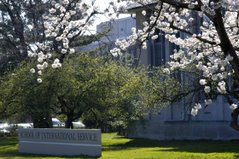
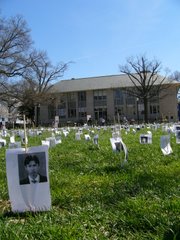

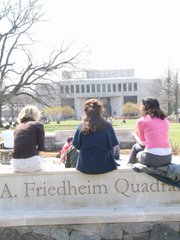
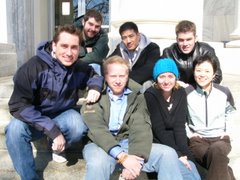
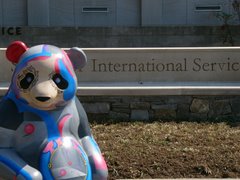
No comments:
Post a Comment